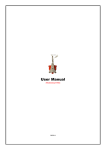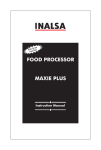Download Multi-National Corporations and India: Kabhi Khushi, Kabhi Gham
Transcript
Article published in the April 2003 issue of the Industrial Product Finder, page 160. Multi-National Corporations and India: Kabhi Khushi, Kabhi Gham By Harshwardhan Gupta Various MNCs’ contribution to India’s industrial development has been a very mixed blessing. The entries of all hues of MNCs have made the industrial development scene even more uneven and patchy. However, the scene is changing faster than ever, and I suppose it is just a short time before even this picture changes significantly. In this articles, besides MNCs assembling or manufacturing industrial as well as consumer goods in India, I have counted in small foreign companies manufacturing or only collaborating in India; and MNCs and small foreign companies who have only set up marketing, sales and service networks in India. Let us examine this from various aspects. THE CONSUMER is having a gala time, so says everyone. The open-door policies and the entry of MNCs have totally transformed India from a seller’s borough into a buyer’s market. Washing machines which really wash whitest, detergents which work, computer monitors that are easy on the eye, energy-saving light-bulbs, capability-packed servomotors, excellent pneumatic hardware, and the most noticeable of them all: so many swanky, fuel-efficient and much safer cars. It did begin with some dumping of outdated designs in India, but the competition among the MNCs themselves soon corrected the picture in the consumers’ favour. Nevertheless, the Indian consumer is demanding and ignorant at the same time, and he often pays dearly for his ignorance. There are pockets where the MNCs have left the consumer out of the loop. Take the case of toothpastes. The best way to clean your teeth is not with toothpaste at all, but with a water pick, or a water jet. No one has yet brought personal water jet dental care to India. An electrocuting mosquito killer actually works better, yet allethrin based repellents do a multi-billion Rupee business in India. More the various mosquito species become resistant, more these businesses grow. Not a single MNC-made car user’s manual tells the user to lock ALL doors while driving, which can actually save your life in a collision. The doors, when locked, are designed not to fly open upon impact, so the passenger space resists collapsing. Yet no one tells the consumer, not even the private insurance MNCs, the direct losers in this case. On the contrary, practically every ad for cars and two-wheelers spurs you on to drive even more recklessly. The industrial consumer is in a flux too. Excellent high-tech machines, parts, sub-systems and consumables used by the industry are coming in, but no appropriate information system is in place to quickly bring the industrial consumer and supplier together – the way it can be done in developed countries. Those who are into distributing this information frequently have the data organized in such a higgledy-piggledy way that it is not at all easy to use. For all our IT and telecom explosion, we still are exceedingly poor at disseminating essential information to the buyer. This is putting a wet blanket on everyone’s progress. One of the bad cases of communication gap is between mechanical engineer buyers/users and MNC makers/sellers of electromechanical products like servo-valves, PLCs, stepper motors. Their product manuals are one of the most user-unfriendly. On the other side, the standard Indian reaction to anything new and better is to denounce it first, giving very technical-sounding “knowledgeable” explanations. When MARUTI made its appearance, it was dubbed “absolutely flimsy”! When radial tyres came in, they were “totally unsuited for Indian roads and damaged the suspension.” When ELCBs came, the electricians (who otherwise use copper wires as fuse) would not trust them. When washing machines came, they “tore up the clothes.” People still put a screen in front of today’s low-radiation monitors, and keep the brightness so low that they constantly strain their eyes. Engineers still can’t believe that pneumatics run better on dry air. Many companies still courier or post a printout of every email they send. This attitude of the “educated” middle class has killed (or seriously delayed the success of) many a good products from abroad. And the market is flooded with junk food and trashy “Designer” stuff from competing MNCs, who know that the quickest way to the Indian consumer’s wallet is either through his stomach, or through his vanity. It is easy to sell trash to new gullible buyers, but unless you offer real value for money, you do not survive for long in a buyers’ market. Generally, we will see better designs from abroad only after we buy the bad stuff for some time. Cynical, but true! In reality, if the MNCs do some in-depth, cool-headed, objective consumer research, they AND the consumer will both benefit. THE EMPLOYEES are having a nice time too, if truth be told. The slogan-shouting crowds have got it all wrong. The workers in the developed world are out of jobs, because their jobs have shifted to India and other developing countries. Yes, inefficiency, overstaffing, time-pass at company’s expense has stopped. But what is wrong with that? We want a comfortable life, and we do not want to work hard for it? The world does not work that way any more (just look at communist China), and the MNCs have nothing to do with this change. We ourselves have brought the Genie of job insecurity out of its bottle because we did not learn our lessons in time. As our scriptures tell us, when one avenues closes, others open. A Railway clerk’s son works with a call center that services an MNC. A VRS-after-30-years employee’s daughter works with a software MNC. Sure, it is hard to find work today because our population is bursting at the seams. However, if one re-trains for a new job and is willing to work hard, one need not remain unemployed. The MNCs are fast changing the lethargic work culture of India, and that is good for everyone. THE SUPPLIERS: A few are laughing all the way to the bank, others are crying. The good suppliers have to work harder and shed fat to remain viable –that’s good again – and the bad ones are being driven out very quickly. They in turn are trying to pull down the good ones by under-quoting, even taking a loss. Many vendor industries are busy cutting corner after corner, blindly copying, slashing prices, undermining competitors, never innovating, and still dying. This is a serious state of affairs, and will destroy many in its wake. THE PURCHASERS: Parallely, many MNCs have latched on to the typically Indian affliction of pulling appalling extents of credit out of the suppliers after mercilessly hammering them down on prices. 120 days’ and 150 days’ credit is unheard-of in the MNCs’ parent countries, yet they do it here with impunity. This is slowly emptying the working-capital base of the economy, but again, no one is bothered. The purchase guys, usually picked up from older domestic industries; bring all sorts of dubious practices into the purchase office, and though they can show quick gains, they actually harm their employer in the long run. The foreign-born (also Indian) CEOs of these MNCs often fail to keep a watch over employees harming the interests of the company, because “everybody is new and learning on the job!” THE FACTORIES: Nice-looking structures are coming up and all sorts of new technology is being brought in, but it is sad to watch the older domestic industry now bitterly pay the price of not investing in R&D during the post-imperial socialistic License-Permit Raj. Today, in just a decade of liberalization, the contrast between the factories of an old domestic and a new MNC manufacturing the same product has become horrendous. We wonder how such sordid junkyards passed as top-of-the-line factories just a few years ago, when we actually assumed that any factory necessarily had to be nauseatingly filthy! A very curious phenomenon is under way in very many MNCs’ factories: I see breathtakingly beautiful state-ofthe-art imported production machinery married to roadside-welder quality (say) conveying equipment bought from the proud local “atomization” guy. This conveyor has cost just (say) 4 lakhs against a landed price of 65 lakhs for an imported conveyor. It often breaks down. The VP Global Operations comes to India for a visit and disapproves of the monstrosity, then grudgingly acquiesces that it’s too late now. The CEO was influenced by the huge price-difference. A good, comparable-quality Indian conveyor would have cost, say, 12 lakhs – still a fraction – but its maker has long been pushed out of the market by the cheap welder. He has closed down his decent factory and started a fast-food joint. MNCs try and keep the initial investment abnormally low usually because of fickle Government policies. Also, foreign decision-makers usually know nothing of our industrial culture, and often make snap choices on inadequate information, then pay the price slowly. In stark contrast, try as you might in Europe, you simply cannot buy such trashy machinery! Soon a foreign conveyor manufacturer will walk in and our cheapo welder will “take” his agency! Another folly is going on too. MNCs who close their factories abroad and transplant the machines here try and play another self-defeating game. The original operators could diddle and run the aged machines somehow, and produce goods. The green Indian operators can’t get the hang of them. So the CEOs either try to foist the old machines onto even greener vendors, “You want business? Get this machine running at your cost!” Or they invite a few Indian “experts” to offer solutions, pit them against one another, and try and rip them off, so they can hog all the credit. This is Free Market at work in India! It’s not the MNCs who are destroying our entrepreneurship; it is our own guys who are merrily “taking the supari” for them. This is where we have failed as an emerging industrial nation, and very sadly, this scene shows no sign of changing. THE DESIGN BOYS: Many MNC products have never been designed for the Indian weather, habits, body dimensions, lifestyles, education levels, cultural predispositions, blazing sun, and the omnipresent dust – they have simply been put in a 40-foot container and transplanted here. The available luxury cars’ rear seats are too deep for the Indian body type. The average Indian driver, driving in the congested city, must be able to see the road 5 feet ahead of the car, but the dashboard is too high for him / her! Sadly, no scientific ergonomic data on the “average” Indian male and female is publicly available yet. Besides, has any automaker in India ever tried to find a way to keep the car cool (with the engine off) when it is standing in the scorching Indian sun with all windows up? The solution is quite simple, actually, but our innovativeness has become an NRI. The foreign-designed kitchen appliances, tools and accessories do not quite suit the Indian kitchen and cooking ethos, but no one is bothered yet. No MNC has yet brought out a dishwasher that works in India. Again, solutions already exist, but their Global Strategies Team cannot see the woods for the trees. No MNC has yet offered a cockroach-proof easy-to-clean modular kitchen cabinetry system. No such system is designed for the daily swabbing and weekly washing of the Indian kitchen floor. The same with the bathroom! Very few of the pseudo-aristocratic “Designer” fittings and sanitaryware are ergonomically designed. They endlessly cater to the Indian buyers’ hankering for ornamental value above everything else. Ironically, the quickest learners on the block are the junk food and toiletries makers – gulab-jamun ice cream, methi-muttermalai pizzas, curry-patta deodorants and jal-jeera mouthwash are just round the corner! THE SALES FORCE: It’s time the management institutes brought their curriculum in line with the door-to-door / counter salesmen’s needs; as that is where most MBAs are landing up. For all their well-rehearsed sales hype, almost all MNC’s “sales-executives” have a very poor knowledge of their products’ limitations, working principles or construction, and get very awkward with a knowledgeable customer – I have actually heard this line, “Sir, actually I’m not a technically savvy person!” No problem! In their minds they are totally convinced, “If it’s an MNC product, the Indian customer ought to believe it’s good for him!” Same attitude obtains in the insurance and financial product market. THE MARKETEERS: Jeeto, India, Jeeto! “One NoKleena washing machine free* with the latest MachMobile SUV (Sports Utility Vehicle – politically correct word for a heavy car with macho grills and fat tyres)! One 17 ¼” HazyBuzzy color TV free with the washing machine! One SuperKool steam iron free with the color TV! One BlackBeauty fairness cream Super-Saver twin-pack free with the steam iron! One JellyBelly Basmati rice sample pack (with sach-much 25% extraaa free) absolutely free with the fairness cream! Pack kholo, coupon pao, scratch karo, paagal ho jao! First 3 Winners get a Lucky Gold Coin and a one-way ticket to the next World Cup, plus a Surprise Gift Hamper presented by Miss Anti-Dandruff 2003! Free 0% interest loan in 5¾ minutes – just bring your grandmother’s school-leaving certificate and 2 latest doodhwale-ka-bills in original. You save Rs. 13,974.56! Offer extended by popular demand to 5.47 pm today or till stocks last (whichever is earlier). Added Bonus Only Today – Rs. 2,193 off if you bring in your old car’s driver’s seat (any make / model but in working condition)! Lucky Winners will be announced on Friday the 13th on “World’s Scariest Car Crashes” on K-channel. H-u-r-r-y-y-y!!! (*Conditions apply)” Yippee! Total chaos FREE with everything! Foreign Company ka scheme hai! Does any Government agency or consumer group ever monitor these zillion weirdo “schemes”? And how come no one gives spare fuses, or spark plugs, or rear seat belts free with a car? Does any refrigerator manufacturer ever think of offering modular rectangular storage containers free, so the space could be utilized better? Did you ever get a set of appropriate plastic heating containers with a microwave oven? The customers would be far more appreciative if useful stuff is given free (or even at a price) instead of wacky gifts. Or the prices could be lowered if this madness were turned off. THE MEDIA, in one word, has gone absolutely berserk! So many advertisers, so little space! So many sponsors, so little prime time! Brassy mindlessness has steamrolled everything in its path. If the media takes a breather from the ongoing Dhamaka, we could have some peace on the idiot box! (Keep wishing!) Thankfully, newspapers cannot talk, yet! Such gross Laissez Faire is going on in advertising and marketing that the Government is ready to impose pre-censorship on TV ads. And MNCs are in the forefront of it all. The latest shooting star is “sponsored news!” Unlike European media, Indian media does not encourage strictly non-sponsored evaluation of new products by users and specialists. Nor is enough space / time given to genuinely dissatisfied consumers of MNCs, as is devoted to the victims of Government-run services. The US has an Equal Opportunity Law for their media; we do not. THE GOVERNMENT: MNCs ko gussa kyoon aata hai? Things change, but as always, too little and too late! No further comments – this horse has been beaten to death. I suppose that pollution-free electric mass-transit systems will be installed only after portable little personal oxygen cylinders start selling like hot cakes! With lights out at ENRON, we Indians are now eternally condemned to powerlessness. THE “ABSENTEES”: Now that the “roadblocks” have been removed, the total Indian industrial scene, instead on being on a steady road to development, has become awfully uneven and full of nasty potholes. A few instances: Some years ago, an excellent range of German bathroom fittings, sanitaryware, etc., were brought to India by a builder. Neither he nor his principals had any clue how to market such products in India, and the whole operation collapsed in a few months. About a decade ago, a big Indian name imported a truly miraculous water-repellent coating for car windshields. You could actually drive for hours in a drizzle, even in torrential rain, with the wipers off! This useful product soon disappeared, and now their wonderful car-body polish has vanished too! Both were products of breakthrough technology by MNCs, and excellent value for money. Many products that are really needed, and will do good business too, are not coming in yet: Machines for laying pipes and cables without digging; compact paper shredders; Energy-efficient in-line water heaters which switch on and off as the tap is opened and closed; Power-steering retrofit-kits for heavy vehicles; Radial tyres for trucks, etc. Very safe and comfortable integral-shell buses are just about beginning to appear on the roads. Unfortunately, many decades will pass before they become the norm. Today, you get good blister-packing machines made under collaborations with MNCs, but no tabletting or wet labeling machines. We have been making world-class 3-phase AC motors in 63-frame size onwards for ages, but try as you might, you just can’t get a similar motor smaller than 63-frame, and these are often needed. You cannot buy safe child-carriers for any car. Though you get excellent L-shaped Allen keys, you cannot buy Allen-drivers with a screwdriver-type handle – an unbelievably handy tool! Absolutely no one makes or markets good-quality circlip pliers in India. Ditto for hook spanners. You cannot buy the excellent German KOPP domestic switches any more. Nonetheless, the market is flooded with many poorly designed global brands. You do not get child-safe Mylar toy balloons in India. You do not get childproof household containers either. You get a dazzling array of halogen display spotlights, but no waterproof bright halogen machine lamps are available to make the operator’s life easier, which will reduce rejections. You get an exploding variety of fancy factory-made wooden furniture from various MNCs but do not get non-slip abrasive stick-on tape for staircase steps. You cannot buy realistically priced aluminium structural sections and fittings for do-it-yourself machineguards and frames – nor sensibly priced ink-jet batch-coders for packaging machines. No shipping-case fillers are on the market, so a typical mass-producing MNC factory has just 3 persons watching the fully automatic production and primary packaging line zip at full speed, followed by 24 poorly paid contract laborers working frantically to pack the product into shipping cartons manually. SO WHERE IS IT GOING WRONG? Many multinational industrial product makers either get together with the wrong kind of Indian partners, or unknowingly appoint the wrong kinds of CEOs. Others get the right product in and kill it with unsuitable marketing. Several have their own rigid ways and policies, and will not change to suit. Many impose their original marketing methods, which fall flat in India. Countless others believe Indian labour is cheap, so why mechanize or automate? Soon they pay the price for the expensive consequences of employing such cheap labour. Almost all don’t know how to market a new concept in India. Many MNCs take advantage of our flaccid, vague laws – as was evident in the recent discovery of dangerous levels of pesticides in bottled water. Lots of medicines, drugs, toxic colors and pesticides banned in developed countries are merrily being made / used / imported. Some ice cream brands carry the green veg dot; others carry the brown non-veg dot. Diabetes is endemic in India, yet no MNC takes it upon itself to declare the calorie-content of its products. Other MNCs doggedly carry on with an utterly callous policy of selling a product very cheap, then pricing the spares and consumables sky-high. If the product fails two days out of warranty, they first charge an obscene amount just for giving you a repair quote. After paying that, you are patiently told that it is cheaper to buy a new machine than to get it repaired. And this really goes against our ingrained Indian culture of not letting anything go waste. It is this kind of policies that create disgust for MNCs in the average middle-class consumers’ minds. But no one is listening. Other MNCs set shop in India and import all sorts of products in, but not get enough good manufacturing technology in, nor develop it locally and integrate it with Indian production machines. The result? Despite a lot of “below-par” loss-making pricing, many directly imported MNC products are still too expensive, or are not marketed right. Thus many excellent products lose their initial foothold in the extremely price-sensitive Indian market, and their manufacturing and assembly technology never comes to India. Then the “bad” word spreads, and puts India at a further unfair disadvantage. Parallely, despite all our excellence in (and contribution to) CAD software, the Indian innovativeness is getting drowned in the deluge of designs from abroad. India kept itself insulated from industrial progress and research from 1947 to the late 80s. We ridicule the Iron and the Bamboo Curtains; but industrially, they progressed far beyond us in those years, as we lived like a pariah behind a tattered jute curtain. It is only now, basking in the glory of “our” NRIs, we are beginning to shed our begging-bowl image and be noticed in the developed world, that we too exist. “Made in India” can’t even begin to dream to compete with “Made in Germany.” I do hope that our domestic industry will learn quickly from the MNCs, and then offer them real tough competition, as the TATA INDICA has done of late. This is happening sporadically in a few other areas too. Nevertheless, it is high time that we stopped looking at ourselves through the eyes of others, and got busy achieving, building, and raising our own standards. “But why unnecessary you are taking so much tension yaar? Jaane de naa!" Comments and reactions welcome by the author at [email protected]. He graduated from I.I.T. Bombay in mechanical engineering in 1976. He designs unusual, complex and high-speed machines at Neubauplan Machine Design Studio, his own independent consulting machine-design firm in Pune since 1981. Website: www.neubauplan.com.





















